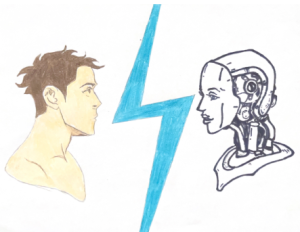Unraveled: the AI enigma

Becoming a hot topic in recent months, AI has taken the internet by storm.
May 21, 2023
To those of the next and current generations,
Be vigilant! With the ever-increasing presence of AI in our daily lives, including the release of ChatGPT and Bard; many questions have been asked by some of the world’s most prominent entrepreneurs; attempting to cast light on AI’s grim shadow.
“It is, I think, actually a bigger risk to society than cars or planes or medicine,” said Musk.
He isn’t he first to raise concern. More than six years ago, the late Stephen Hawking, one of the world’s most renowned theoretical researchers, warned about the potential dangers of AI.
“Unless we learn how to prepare for, and avoid, the potential risks, AI could be the worst event in the history of our civilization. It brings dangers, like powerful autonomous weapons, or new ways for the few to oppress the many. It could bring great disruption to our economy,” said Hawking.
Multiple variations of AI have been released, ChatGPT being the most popular one. According to Open AI, ChatGPT “interacts in a conversational way. [It utilizes] dialogue format [that] makes it possible for ChatGPT to answer followup questions, admit its mistakes, challenge incorrect premises, and reject inappropriate requests.”
This implies that with each successive iteration, including the recently released GPT-4, the AI will progressively develop its own intelligence. This notion is causing individuals to contemplate what would occur if AI were to surpass human intelligence. Well — Churchill decades ago gave a statement later popularized by Spiderman: “With great power, there comes great responsibility,” providing insight on the measures that should be taken into account.
Ironically, Musk has shown recent regret in helping to create his original non-profit organization. He recognizes that AI initially seemed helpful, apart from government’s involvement. But he now worries that AI could turn against humanity. What would happen, he ponders, if the advancement of AI doesn’t slow down? Could it lead to our demise?
“ChatGPT which is based off of GPT4 from OpenAI, is the company that I played a critical role in. It [exists] because Larry Page and I used to be close friends…, and I would talk to him late into the night about AI safety. [But] Larry was not taking AI safety seriously enough. Now what happens when something vastly smarter than the smartest person comes along in silicon form? It’s very difficult to predict,” said Musk.
Teachers on campus have also begun to consider the AI’s impact on teaching. Is AI a threat to their jobs? What does an essay look like anymore? Does everything become an assignment that has to be done in the classroom?
“There are the obvious things; kids can cheat on everything now. Bad things can happen when people get lazy and complacent. But if they look at AI as part of the research process as opposed to the endgame, it can be a really handy tool. said Mr. Evans.
AI has advanced so quickly that teachers are sprinting to maintain pace. Students have begun to take advantage of ChatGPT’s ability to write complete essays, do research, and answer nearly any question it is asked, all in a matter of seconds.
“It’s frustrating and disheartening as a teacher because we come into this career to work with students and support you to learn and grow in a community. When so many students rely on whatever app or AI, it’s just the easy way out. Its taught laziness,” said Mrs. Kuramata.
Not only that, other industries are also being affected by the introduction of artificial intelligence, both positively and negatively. While AI may not be able to replace certain roles, it can help to achieve better results.
“AI can make decisions; but can it make right decisions? Only humans can do this up until now, but for an executive role I find it hard [to believe], but it’s not impossible. The future would be integrated into the machines, being faster and more efficient; it can help diagnose problems, and [achieve more] connectivity. “AI, like anything, is uncharted waters, but it will develop; it can be a blessing or it can be a disaster. It will be a norm in the future.” said George Riad, the Chief Operating Officer of California Aseptic Beverages.
Moreover, things have begun to take a weird turn, as AI moves closer to sentience. While this may have sounded impossible a few years ago, it’s becoming more probable now. The line between man and machine is becoming even finer.
“[For example,] some of the current technologies that were deemed impossible years ago [such as] AI, will evolve and become smarter; and will [have the ability] to [potentially] mimic human intelligence and feelings,” said Riad.
Even Google, the current search engine titan, is feeling the threat. When Microsoft recently released Edge, the company incorporated AI into its search engine. Although Google has attempted its own AI, their technology pales in comparison, as it blundered its first demonstration. It’s like we are blindly embracing change for the sake of progress; though it’s human nature to bring forth competition, we must ask ourselves at what cost? Imagine if we begin to depend on AI that is not reliable.
“AI, like anything else, has to be a tool and cannot be a solution in itself. We need to be deliberate in the way we approach and use AI along those lines – going to everything with a wariness of the pros and cons. That’s a good way to approach anything. As far as regulations, when the safety of others is involved, for the sake of the people that they represent, that government should step in to regulate things,” said Evans.
In the end, as we all stare at our devices, one underlying question remains: Will AI render us obsolete? One thing for certain, is that humanity is able to harness our mechanical marvels for good, and we can reach unimaginable heights. But curiosity must come with caution, as dangerous waters are ahead. The future lies in the palm of our very hands – for now.






